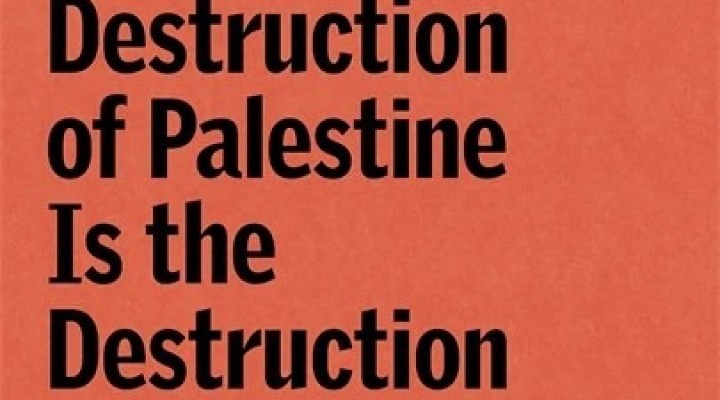The Destruction of Palestine is the Destruction of the Earth
- Ramona Wadi
- Monday 6 Jan 25
- 1215
- 0

- Book Author(s):Andreas Malm
- Published Date:2025
- Publisher:Verso Books
- ISBN-13:9781836740070
Referring to Frantz Fanon in the preface to The Destruction of Palestine is the Destruction of the Earth (Verso Books, 2025), Andreas Malm ponders the exhibitionist nature of the coloniser. “Every suggestion of a limit to the destructive power of the settler colonial state is received as a questioning of its unlimited mastery, and so it must be met with a frenzy of recidivism,” he writes.
The context in this case is Israel’s genocide in Gaza. Malm, however, discusses the destruction of Palestine in the context of a settler-colonial history that is linked intrinsically to fossil fuels and, as a result, the destruction of the earth. Palestine, the author writes, is depicted as “a microcosm of a larger process,” which is traced back to 1840 and the British Empire’ deployment of steamboats to advance its imperial interests in the Middle East, namely Lebanon and Palestine. Such was the destruction in Beirut and Akka to secure free trade in the Middle East for the British Empire, that the extensive killing of civilians by the British was described as the means through which to force surrender. In 1841, British troops briefly occupied Gaza, destroying its food resources to arrive at Egypt’s surrender and destroy the cotton industry in the Middle East.
During the same period, Britan had also proposed Jewish colonisation of Palestine, at a time when Christian Zionism had already gained political momentum.
Britain, Malm writes, perceived Jewish colonisation of Palestine as an extension of its own capitalist interests. “On the ground, the advance detachments of Zionism were formed by officers in the imperial bureaucracy.” Besides military and imperial interests, the barren land myth was already being promoted as needing to be replenished “with the energetic people”, a reference to Jews.
Malm describes succinctly the unfolding scenarios thus: “This, then, was the moment of conception for two interrelated principles: one, no people exists in Palestine; two, the land must be taken with the force of technology running on fossil fuels.”
The author points out that, “Before Zionism was Jewish, it was imperial.” The genocide in Gaza, therefore, is following a scripted path that is integral to Zionist settler-colonialism.
Meanwhile, as the first Jewish settler-colonies were established on Palestinian land, oil became the next imperialist pursuit. The book notes that the British Mandate administration used oil to ensure ongoing land dispossession, and that the oil-based infrastructure enabled settlers to appropriate citrus production, and domination over the ports, imports and exports. Oil companies and in time the US, which became a main actor in the region after the British Mandate period, benefited from Israel’s presence in the Middle East. Malm describes the so-called Plan Dalet — a Zionist blueprint for the ethnic cleansing of the indigenous people of Palestine —as the script for Palestine’s destruction preceded by a vision of complete control over the region and access to natural resources.
Notably, Malm writes, Palestinian liberation was regarded by the US as “a threat to the domination of the Middle East as a whole, with all its invaluable oil reserves.”
Having secured Israel’s existence, defending colonialism was the next step post-1967.
The book shows how Israel plays a major role in the oil and gas industry, and how its supporters contribute towards its position, notably Israel’s standing since 2022 as a gas and oil supplier following the start of the war in Ukraine. Even as Israel continues with its genocide in Gaza, it is still benefiting from gas exploration which now also directly ties in to the Abraham Accords and, as a result, involves Arab and Gulf states in the imperialist destruction of Palestine and the earth.
Malm’s book continues with several critiques of existing political analysis discussing the US role in Israel’s colonisation of Palestine, as well as the genocide, and argues in favour of the US as a major player in decision-making, which also reflects the Palestinian left’s analysis, notably the Popular Front for the Liberation of Palestine (PFLP).
While the book is based largely on tracing the history of fossil fuels in relation to imperialism, colonisation and capitalism, Malm also links to recent history that validates his critique. Notably, outgoing President Joe Biden who, on several occasions, has said that Israel is the best investment the US ever made in the Middle East.
Malm’s analysis, which concludes with the current genocide in Gaza and Palestinian resistance against colonialism, offers a new approach towards understanding the role imperialism plays in maintaining the Zionist colonial project and one that may be overlooked due to the more immediate focus on the depletion of Palestinian territory and the Palestinian people themselves. “Israel and the US shared the imperative of restored deterrence,” Malm writes. The complicity in Gaza’s genocide – complete annihilation – is not only a message for Gaza, but also for the region and any other area which dares to oppose it.
https://www.middleeastmonitor.com/20250106-the-destruction-of-palestine-is-the-destruction-of-the-earth/

Ramona Wadi
Ramona Wadi is an independent researcher, freelance journalist, book reviewer and blogger. Her writing covers a range of themes in relation to Palestine, Chile and Latin America.
 TheAltWorld
TheAltWorld
0 thoughts on “The Destruction of Palestine is the Destruction of the Earth”